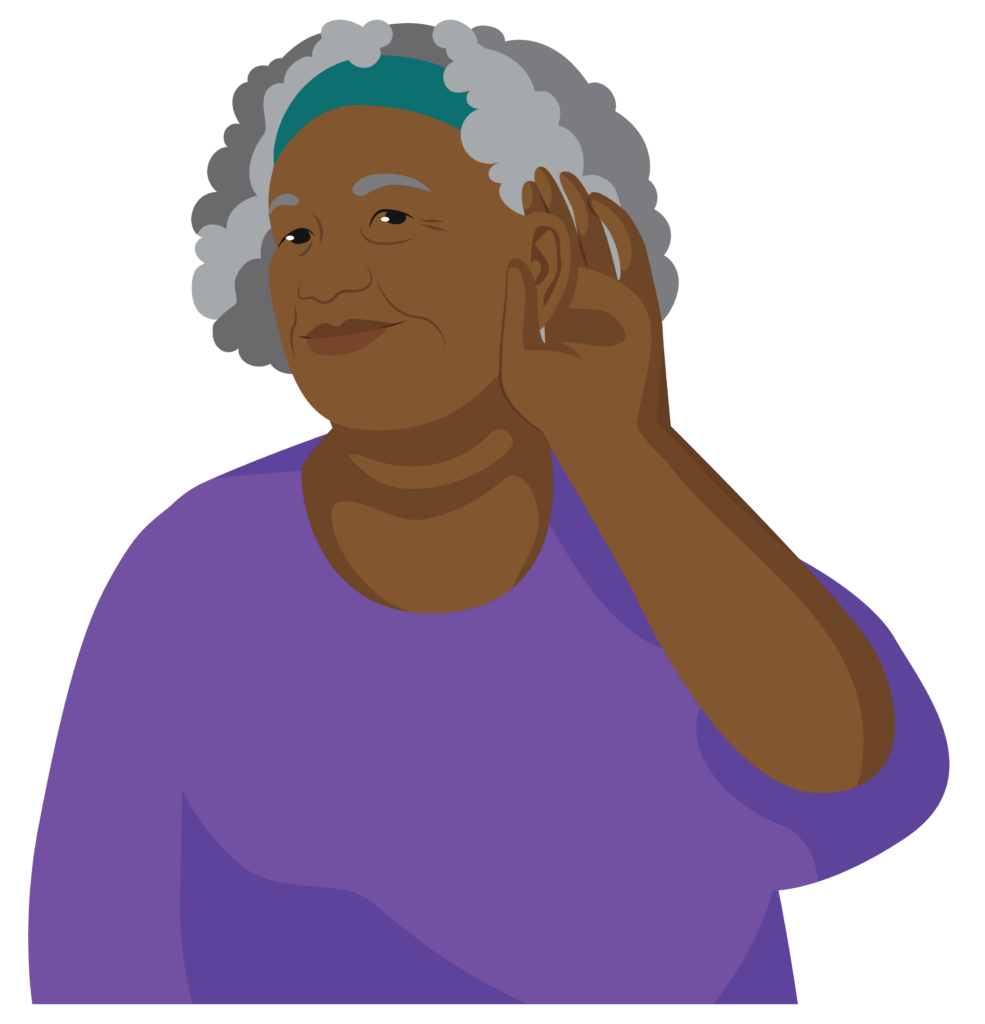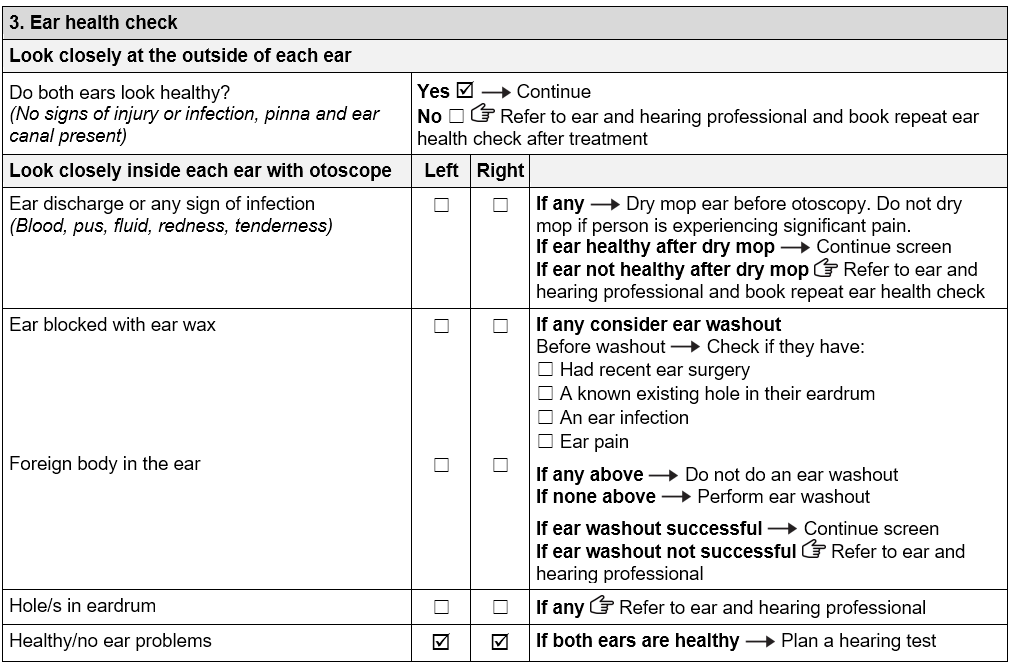የማጣሪያ ጥያቄዎችን ከጨረሱ በኋላ የሚከተሉትን ማድረግ አለብዎት:
- ሰውዬው ሌላ አጋዥ ምርቶች ፍላጎት እንዳለው ያረጋግጡ
- ስለቀጣዩ እርምጃዎች ከአንድ ሰው ጋር እቅድ ያውጡ።
ሌሎች አጋዥ ምርቶች

አንድ ሰው በሌሎች አካባቢዎች እርዳታ ሊጠቀም ይችላል።
መመሪያ
ጠይቅ ፡ ከዚህ ጋር ተቸግረሃል
- ራዕይ
- ተንቀሳቃሽነት
- ራስን መንከባከብ
- ግንኙነት
- ግንዛቤ (ማሰብ/ማስታወስ)።
ግለሰቡ በእነዚህ ቦታዎች ላይ ችግሮች እንዳሉባቸው ከነገራቸው ተጨማሪ መረጃ ለማግኘት ጥያቄዎችን መጠየቅ እንደሚፈልጉ ያስረዱ።
እቅድ

መመሪያ
እቅዱን በማያ ገጹ ታችኛው ክፍል ላይ ይመዝግቡ።
ስክሪን
ሰውዬው በሌሎች አካባቢዎች ችግር እንዳለበት እና ለሌሎች አጋዥ ምርቶች ስክሪን መጠቀም ይችሉ እንደሆነ ይወስኑ።
መመሪያ
እርስዎን ለማገዝ የማጣሪያ መሳሪያዎችን እና/ወይም ጥያቄዎችን ከሌሎች የTAP መግቢያ ሞጁሎች ይጠቀሙ።
ማሊክን አስታውስ?

ማሊክካ 70 ዓመቷ ነው። ከቤተሰቧ ጋር የምትኖር ሴት አያት ነች።
በጆሮ ጤና ስክሪን ወቅት ማሊካ በሌሎች አካባቢዎች ምንም አይነት ችግር እንዳለባት ይጠይቃሉ። ማንበብና መስፋት መቸገሯን ትገልጻለች። ከአሁን በኋላ ለመስፋት በደንብ ማየት አትችልም።
ተጨማሪ ጥያቄዎችን ትጠይቃለህ እና ራዕይ አጋዥ ምርቶች ወይም ወደ ሌሎች አገልግሎቶች ማዞር ሊረዳህ እንደሚችል ለማየት የእይታ ስክሪን ለማጠናቀቅ ተስማምተሃል።
ይገምግሙ
የአንድ ሰው ጆሮ ሁለቱም ጤናማ ከሆኑ፣ የመስማት ችሎታ ምርመራውን ለመቀጠል እቅድ ያውጡ።
ጥያቄ

ዮሐንስን አስታውስ?
የተጠናቀቀውን የጆሮ ጤና ፍተሻ ክፍል የጆን ጆሮ ጤና ስክሪን ይመልከቱ።

ለጆን የመስማት ችሎታ ፈተናን ለማጠናቀቅ እቅድ ኖሯል?
አንዱን ይምረጡ።
አዎ ልክ ነው!
የጆን ጆሮዎች ሲፈተሹ በሁለቱም በኩል ጤናማ ይመስላሉ. በኦቲስኮፕ ሲታዩ በውስጣቸውም ጤናማ ነበሩ. ለጆን የመስማት ችሎታ ምርመራ መቀጠል ይችላሉ.
ያጣቅሱ
ለማጣሪያ ጥያቄዎች ሰውዬው የሰጣቸው መልሶች ሪፈራል ጠቃሚ መሆን አለመሆኑን ለመወሰን ይረዳዎታል።
አንድን ሰው መቼ እንደሚያመለክት እና የት እንደሚልክ ማወቅ አስፈላጊ ነው.
- አንዳንድ ሰዎች ለጆሮ ጤና ችግር ወይም እርስዎ ወይም አገልግሎትዎ ሊሰጡ ከሚችሉት በላይ ልዩ እንክብካቤ ሊያስፈልጋቸው ይችላል። የጆሮ እና የመስማት ችሎታ ባለሙያን ይመልከቱ።
- አንድ ሰው ቀደም ሲል የመስሚያ መርጃ መሣሪያ ከተሰጠ ወደ ቀድሞው አገልግሎት ሰጪው በመምራት ተጠቃሚ ይሆናል። የመስሚያ መርጃ አገልግሎትን ተመልከት።
- አንድ ሰው ሌሎች ፍላጎቶች ሊኖሩት እና ወደ ሌላ የአገልግሎት ዓይነት በመምራት ሊጠቅም ይችላል። ይህንን በቅጹ ላይ ይመዝግቡ።
ሪፈራሎች ሁል ጊዜ ከሰውየው ጋር መወያየት እና መስማማት አለባቸው።
ጥያቄ
የማጣሪያ ጥያቄዎችን ይመልከቱ እና ከታች ስላሉት ሰዎች ያንብቡ። ወደ ጆሮ እና የመስማት ባለሙያ ማነው መቅረብ ያለበት?
1. አሪ 4 ዓመቷ ነው, ከእናቷ ጋር የጆሮ ጤና ስክሪን ላይ ትገኛለች.
አሪ መጠቀስ አለበት?
አንዱን ይምረጡ።
አዎ ልክ ነው!
ከ 5 ዓመት በታች የሆነ ማንኛውም ልጅ መሆን አለበት ለግምገማ ለጆሮ እና የመስማት ባለሙያ.
2. ጄ ከአባቱ ጋር የጆሮ ጤና ስክሪን ላይ የሚከታተል የ7 አመት ተማሪ ነው። ባለፈው አመት ሶስት ጊዜ ከጆሮው የሚወጣ ፈሳሽ አጋጥሞታል.
ጄ መጠቀስ አለበት?
አንዱን ይምረጡ።
አዎ ልክ ነው!
ጄ ከ 5 አመት በላይ ነው. ይሁን እንጂ በአንደኛው ጆሮው ውስጥ ተደጋጋሚ ፈሳሽ ያጋጥመዋል እናም መሆን አለበት ወደ ጆሮ እና የመስማት ችሎታ ባለሙያ መላክ.
3. አህመድ የ25 አመት ወጣት ሲሆን ከእንክብካቤ ሰጪው ጋር የጆሮ ጤና ስክሪን እየተከታተለ ነው። ለመግባባት መናገር አይችልም.
አህመድ መጠቀስ አለበት?
አንዱን ይምረጡ።
አዎ ልክ ነው!
አህመድ ንግግርን ለመግባባት አይጠቀምም። እሱ የበለጠ ውስብስብ ፍላጎቶች አሉት እና መሆን አለበት። ወደ ጆሮ እና የመስማት ችሎታ ባለሙያ መላክ.
4. ፋራህ የ65 አመት ሴት አያት ናቸው። ቤተሰቦቿ ንግግሮችን ለመስማት መቸገሯን እንዳስተዋሉ ትናገራለች። ከጆሮዋ የሚወጣ ፈሳሽ ወይም ፈሳሽ አላጋጠማትም።
ፋራህ መጠቀስ አለበት?
አንዱን ይምረጡ።
አይደለም ልክ ነው!
ፋራህ ከጤና ሰራተኛዋ ጋር የጆሮ ጤና ምርመራ ማድረግ መቀጠል ትችላለች።
ይከታተሉ
የጆሮ ጤና ማያ ገጽ ይድገሙ
- ግለሰቡ ለጆሮ ጤና ችግር ህክምና እንዲሰጥ ከተላከ፣ ከህክምናው በኋላ ተደጋጋሚ የጆሮ ጤና ስክሪን ያስይዙ።
- የሰውየው ጆሮ ጤናማ ከሆነ የመስማት ችሎታ ምርመራ ማቀድዎን ይቀጥሉ።
- ከህክምናው በኋላ የሰውዬው ጆሮ ጤናማ ካልሆነ; ግለሰቡን ወደ ጆሮ እና የመስማት ችሎታ ባለሙያ ይመልሱ.
ጥያቄ

ፓትሪክን አስታውስ?
ፓትሪክ 6 አመቱ ነው እና በትምህርት ቤት የመስማት ችግር ነበረበት።
ከአባቱ ጋር ለጆሮ ጤና ማሳያ መጥቷል. የማጣሪያ ጥያቄዎችን መመለስ ይችላል። አባቱ በፈሳሽ ፈሳሽ በተደጋጋሚ የጆሮ ኢንፌክሽን እንደነበረው አረጋግጧል።
በፓትሪክ ጆሮ ጤና ምርመራ ይቀጥላሉ?
አንዱን ይምረጡ።
አይደለም ልክ ነው!
ማያ ገጹን ማቆም አለብዎት. ለፓትሪክ እና ለአባቱ በተደጋጋሚ የጆሮ ኢንፌክሽን ስላጋጠመው ወደ ጆሮ እና የመስማት ችሎታ ባለሙያ መቅረብ እንዳለበት ያስረዱ።